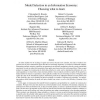Free Online Productivity Tools
i2Speak
i2Symbol
i2OCR
iTex2Img
iWeb2Print
iWeb2Shot
i2Type
iPdf2Split
iPdf2Merge
i2Bopomofo
i2Arabic
i2Style
i2Image
i2PDF
iLatex2Rtf
Sci2ools
CI
2002
2002
Model Selection in an Information Economy: Choosing What to Learn
As online markets for the exchange of goods and services become more common, the study of markets composed at least in part of autonomous agents has taken on increasing importance. In contrast to traditional completeinformation economic scenarios, agents that are operating in an electronic marketplace often do so under considerable uncertainty. In order to reduce their uncertainty, these agents must learn about the world around them. When an agent producer is engaged in a learning task in which data collection is costly, such as learning the preferences of a consumer population, it is faced with a classic decision problem: when to explore and when to exploit. If the agent has a limited number of chances to experiment, it must explicitly consider the cost of learning (in terms of foregone profit) against the value of the information acquired. Information goods add an additional dimension to this problem; due to their flexibility, they can be bundled and priced according to a number of ...
| Added | 17 Dec 2010 |
| Updated | 17 Dec 2010 |
| Type | Journal |
| Year | 2002 |
| Where | CI |
| Authors | Christopher H. Brooks, Robert S. Gazzale, Rajarshi Das, Jeffrey O. Kephart, Jeffrey K. MacKie-Mason, Edmund H. Durfee |
Comments (0)

